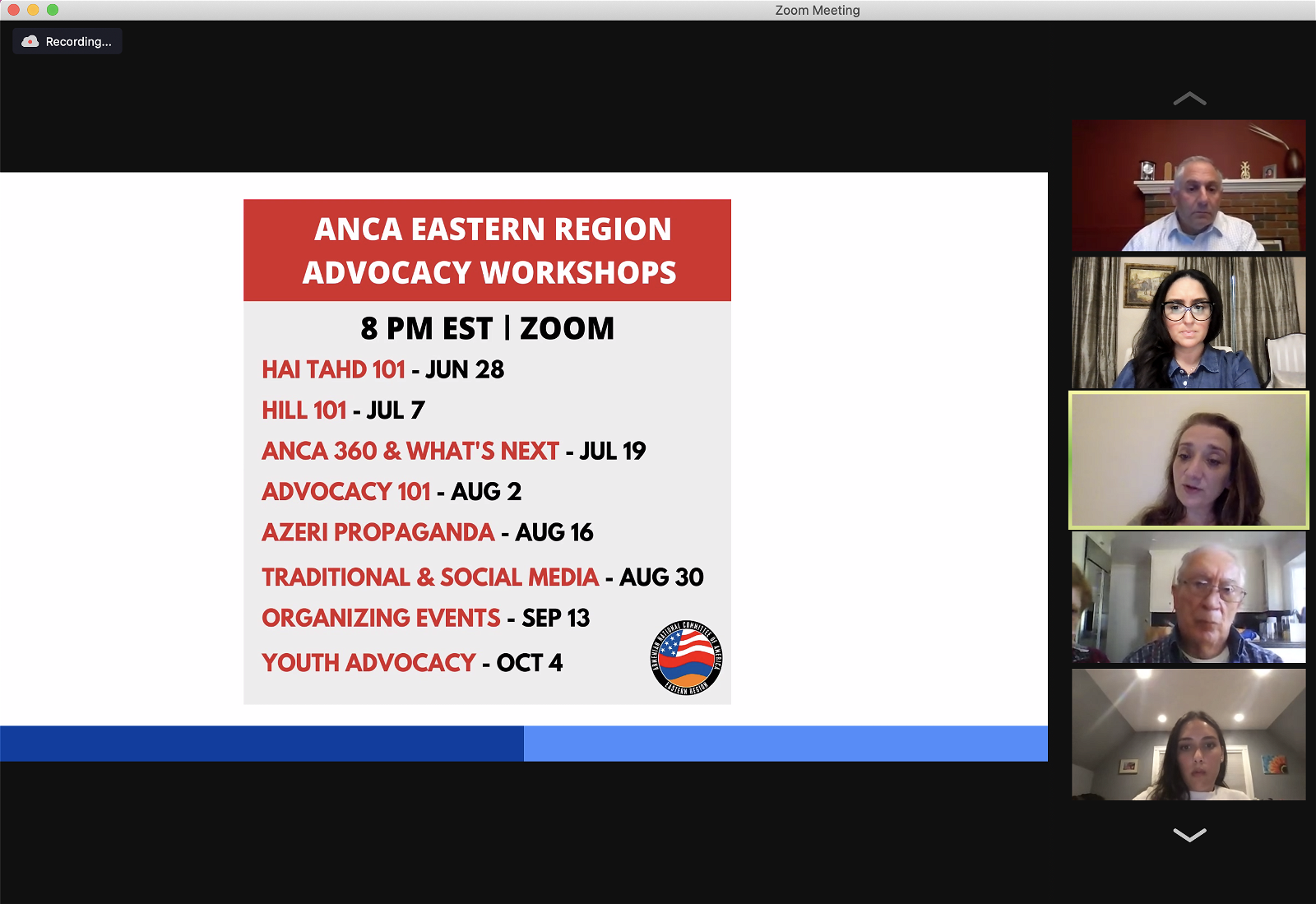“What now?” It’s a question I often find consuming my day-to-day thoughts. As an Armenian, I worry about the fate of my homeland. As an AYF member, I worry about the fate of this new generation and our plight to further the Hai Tahd vision of a free, independent and united Armenia. I am not alone in this worry. It was the same worry my ancestors had when escaping Genocide during the first World War, and it was the same worry my family had when fighting for an independent Armenia, breaking ties from the Soviet Union in 1990. Today, our mission remains the same…for Artsakh and for Armenia.

The Armenian National Committee of America-Eastern Region (ANCA-ER) is propelling that mission through a series of eight virtual advocacy workshops. I joined 40 fellow activists and participated in the first workshop “Hai Tahd 101” held on Monday night. ANCA-ER executive director Tamar Gregorian kicked off the series, which featured a lecture and discussion led by ANCA National Board member and ANCA-ER Board chair Ani Tchaghlasian and ANCA-ER Board member Steve Mesrobian.
“Hai Tahd” is defined as the “pursuit of a free, independent, and united Armenia.” The ways in which the ANCA achieves this vision is multifaceted on a national level, regional level and local level. As a grassroots organization, the ANCA-ER’s 40,000 activists (10,000 of which are rapid responders) create the traction and momentum that we see in government, media and our hometown communities.
A national organization headquartered in Washington, DC, the ANCA reaches communities far and wide through the work of the Eastern Region headquarters in Watertown, MA, and the Western Region headquarters, in Glendale, California. These offices work closely with local and federal political leadership to write legislation and pursue the following national goals:
- US policy on Artsakh, peace and freedom
- US policy on Genocide, truth and justice
- US-Armenia ties, partnership and progress
- US foreign assistance, aid and trade
- US-Turkey ties, integrity and accountability
- ANCA youth, inspiration and empowerment
Some ways in which we can see the work of the ANCA in real-time is the US House and Senate recognition of the Armenian Genocide in 2019, followed by President Joe Biden’s formal recognition on April 24, 2021. Other examples of how these goals have come to fruition include post-war reconstruction and COVID relief for Armenia and Artsakh in the form of US foreign aid and assistance.
On a regional level, the ANCA covers 31 states home to 33 local ANCA chapters each carrying out these national goals using methods that best fit their communities. The vision of the ANCA is carried out through various missions. These regional goals include:
- Pursue our national agenda
- Genocide education, policy and implementation
- Public education, public awareness and advocacy
- Coalition building, for policy and education
- Youth advocacy
- Fundraising
These goals are crucial to the overarching vision of a “free, independent and united Armenia.” However, none of these goals can be made possible without one tactic that proves irreplaceable time and time again, and that is building relationships with locally elected officials. Voting in the United States is a civic duty. Having an equal and fair say in a publicly democratic election is one of the many privileges we are awarded as Diasporan members. However, our duty does not end with the submission of a ballot come Election Day. We must hold these elected officials accountable.
The first step, as an activist of the ANCA is to know who your representatives are and where their offices are located. Building relationships with them can be simple. Call their staffers to support Armenia-focused legislation. Keep their offices informed of developments in Artsakh and Armenia as a registered rapid responder. As a rapid responder, you allow the ANCA to automatically send pre-written letters on your behalf to your district legislators. This initiative ensures that your views and values are shared immediately with key decision makers every time the ANCA posts an action alert. This is especially vital when events develop quickly and every minute counts, and phone calls cannot be made in time. US Senator Bob Menendez and US Senator Ed Markey, who both speak brazenly in condemnation of Azerbaijan and Turkey for their inhumane acts and violation of international law, are prime examples of how the ANCA has successfully built relationships within the US government. This practice is even more important on a local level given that the majority of these elected officials become Congressional and federal representatives later on in their careers.
Building relationships with our locally elected officials will open doors of opportunity for our community to further our regional goals. In 13 states, for example, Genocide education has been put forth as a mandate in school systems. This was made possible by passing resolutions and securing funding for educational resources on a state level. Relationships with these local leaders is also a priceless networking resource to introduce local Armenian communities to other local minority groups that share similar goals (Greeks, Cypriots, Kurds, Assyrians), fulfilling the aims of “coalition building.” Our local leaders are the gateway to the ANCA’s success on a national level. Being a grassroots organization is what makes our roles, as local activists, within our community so crucial.
Being an activist means to carry out advocacy. As an Armenian, advocacy means justice—justice for the Armenian Genocide committed in 1915, justice for our ancestral lands, justice for our homeland of Artsakh and Armenia, and justice for our Armenian people. Much, if not all, of this responsibility lies in our future generation of activists, our youth. We must be patient with them and their new ideas. We must encourage them to contribute, and we must support them to continue the mission of establishing a free, independent and united Armenia.
As an ANC-NY board member, an AYF leader and an Armenian prioritizing the fate of my homeland, I encourage you all to participate in the ANCA-ER advocacy workshops. It will unite us as a Diaspora in conversation. It will enlighten us on how we can effectively advocate for Armenia and generate ideas to take us to the next level. Reach out to your locally elected officials, your local ANCA chapters and become the voice for the future of Armenia.



Be the first to comment